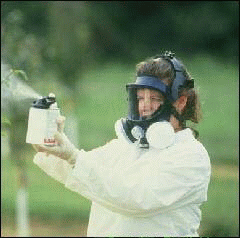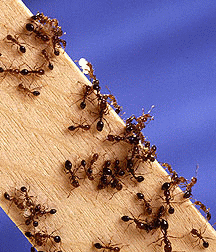Michael Fumento
Factual · Powerful · Original · Iconoclastic
Teddy Tackles the ”Terrorists”
January 01, 2002 · Michael Fumento · Hudson Institute · LawIs the Orkin Man the equivalent of an anthrax-mailing terrorist?
Senator Ted Kennedy thinks so. Or, at least, the Massachusetts Democrat wants
you to think so.

That’s odd; she doesn’t look like a terrorist.
"In recent weeks, the nation has been gripped by the fear of biological and chemical attack," Kennedy said at a press conference in late November. "But every day in schools across the nation, children are exposed to dangerous pesticides that can make them sick."
Oh my! And it doesn’t get any prettier. He went on to say that, "We cannot allow schools to be chemical death traps for our children."
So schools are like roach motels? Are janitors slapping sticky stuff on the floors that relentlessly grips kids’ sneakers? Are the doors one-way, so that children "can check in, but they can’t check out?"
The purpose of the press conference at which Kennedy made his remarkable claims was to urge a House-Senate conference committee to support the Senate version of a bill containing the "School Environmental Protection Act," or SEPA. The amendment in the Senate version would have imposed new regulations on public schools regarding the use of pesticides to eliminate rodents, stinging and biting insects, and cockroaches and other disease-carrying bugs.
Nonetheless, the committee was somehow unswayed by such impressive oratory, narrowly voting to drop SEPA from the final bill.
This led to the firing of another volley of choice baloney at the pest management industry.

Fire ants kill 100 Americans a year; will one be your child at school?
The amendment "died today because the chemical-pesticide industry failed to stand up to protect children and make their voice heard," declaimed Jay Feldman, executive director of the D.C.-based advocacy group Beyond Pesticides. New Jersey Senator Bob Torricelli, chief sponsor of the SEPA amendment, also blamed ”the influence of the chemical industry.”
But the industry begs to differ — with good cause.
"We supported it as written, for the very good reason that we helped write it," the president of Responsible Industry for a Sound Environment (RISE) Allen James told me.
Indeed, they did.
After the Senate approved the amendment, an American Crop Protection Association (ACPA) press release declared, "Pesticide Industry Successful in Shaping Torricelli School Amendment." While introducing the amendment on behalf of Sen. Torricelli, Illinois Democrat Richard Durbin singled out both the ACPA and Rise as two of the "groups whose support this amendment enjoys." Beyond Pesticide’s website lists not only these folks as having supported SEPA, but five other national industry groups as well.
After the committee vote, the ACPA and RISE issued a joint press release declaring they were "disappointed to learn of the decision to drop the SEPA amendment."
"We thought it [SEPA] would serve schools well because it wouldn’t be too great of a burden to implement," said RISE’s James.
"It would require new training and new approaches," he said, "so there would be some burden. But it was far better than any previous measure that had been introduced and we thought it provided a reasonable balance between the need to protect children’s health by controlling pests and the need to address the concerns of the very few parents who have worries over pesticide use in schools."
It’s hardly industry’s fault that committee members decided for themselves that the burden on schools might still be too great.
They told the Associated Press that the provision "would slap America’s public schools with a new, unjustified, federal mandate." The National School Boards Association and other academic groups also opposed the bill.
True, the amendment would have been less onerous and expensive for schools to implement than its predecessor, the SEPA act from last year. But in case you haven’t noticed it, times are tough right now.
Delays in pesticide applications and parental notifications, both of which were required by the now-deceased amendment, increase costs. When Maryland enacted legislation in 1998 that required parental notification it added tens of thousands of dollars in expenses to the budgets of individual school systems. Yet the state budgeted no money for it.
It’s unlikely that Kennedy hasn’t noticed that many public schools don’t have lots of spare cash laying around.

More people have died in Ted Kennedy’s car than have ever been killed by a school pesticide application.
A report released this year by the Democratic staff of the Senate Committee on Health, Education, Labor, and Pensions declares: "The nation’s schools face declining budgets, growing enrollments, and tough choices as they struggle to provide a good education for our schoolchildren in the midst of a troubled economy," adding that "schools are taking drastic steps to make ends meet."
Okay, so it’s a bit hyperbolic. But what’s interesting is that Kennedy is the ranking Democrat on that committee and the cover of the report is prominently displayed on his official website. You can even download it from there and read it.
But apparently Kennedy hasn’t.
It’s also too bad he’s not especially good with numbers.
Otherwise, he might know that each year about 50 Americans are stung to death by bees, hornets and wasps. Fire ants kill about 100 Americans annually, forcing 20,000 others to seek treatment. Other insects can also kill, such as ticks carrying Lyme disease and Rocky Mountain spotted fever.
Insects have proved far more lethal to Americans this year than anthrax has, and studies have shown that because of low body-weight children are more susceptible to stings and bites than adults.
Meanwhile, the total number of students known to have died from school pesticide treatments stands at zero.
Whatever Kennedy’s cause, his outrageous rhetoric failed to further it. But he may have succeeded in needlessly scaring parents. And certainly he has made a mockery of Americans murdered by terrorists.
